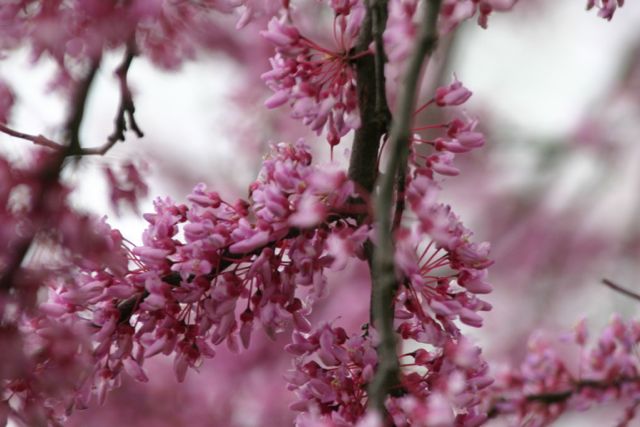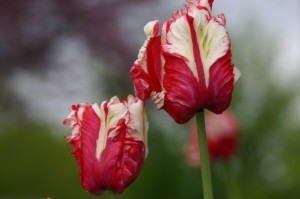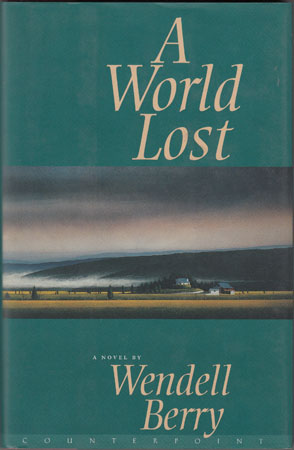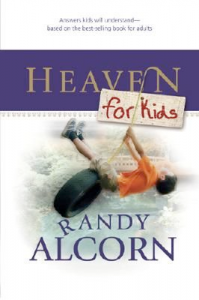
by jphilo | Apr 21, 2014 | Daily Life

Today’s post was supposed to be a mystery novel update. But we returned from a weekend in Wisconsin with family later than expected yesterday afternoon. Then the weather was so nice, Hiram and I decided to take a walk on our gravel road. As we passed the neighbor’s ravine, Hiram mentioned that their red buds will soon be blooming. Before they do, you’re invited to enjoy and anticipate the beauty yet to come, as described in a post that first appeared on this website in May of 2009.
The red buds in our neighbor’s ravine are blooming. Few things compare to the sight of the small trees. Some are barely visible above the underbrush. The still bare branches of the hardwoods – black walnuts, elms, maple and locust – hover over the little trees like anxious parents waiting for their children to perform their spring recital pieces.
The red buds performing beautifully every spring. When I descend the hill into the ravine, they catch my eye and draw it north across the bridge, into the greening woods. The vivid pink-purple of the near trees take my breath away, and I stand transfixed. But beyond them, ten or twenty feet another cluster of trees blooms. A short way beyond that cluster is another, and beyond it, another. On and on they go until the colors blur and meld in the far end of the ravine.
While I look beyond the bridge, a quote from C.S. Lewis’s Narnia series comes to mind. In the last book, when the children get to heaven (oops – I gave away the ending), they rushing up a mountain with their Narnian friends, shouting, “Further up and further in!” They reach the top of the mountain and look out over a great valley. At the end of their vision is another mountain range. “Further up and further in!” they shout, and run to explore the new vista. And when they have scaled that taller, grander mountain, a more beautiful valley awaits, and in the distance, a more spectacular mountain range.
For eternity, they explore the unending wonders of heaven and the eternal God who created it. For one week, I relish the redbuds. Then the blossoms fade and the new leaves of the shade trees overshadow them. But while they last, my heart shouts, “Further up and further in!” when the haze of pink and purple catches my eye. Heaven, I think, will look a lot like my neighbor’s ravine during redbud week.
I can’t wait to get there and go…
Further up and further in,
Further up and further in,
Further up and further in,
For all eternity!

by jphilo | May 3, 2013 | Church Newsletter Columns

“For thus says the Lord:
Do not enter the house of mourning, or go to lament or grieve for them….
Behold, I will silence in this place…the voice of mirth and the voice of gladness…”
Jeremiah 16:5,8
I love celebrations. Weddings. New babies. Birthdays. Anniversaries. Graduations. Reunions. Housewarmings. Funerals of saints who have entered the promised land. I love them all. So the other day, I was horrified by God’s warning in Jeremiah 16 about what would happen to the kingdom of Judah if the people didn’t shape up in a hurry.
In a nutshell, God said, “Don’t go to funerals and comfort grieving family members. Don’t console hurting people or mourn for the dead. Don’t join in celebrations either. But that won’t be hard, because I’m ending weddings and all other happy events because you have forsaken me and followed after other gods.”
My party-loving heart shriveled at this picture of a world devoid of consolation or celebration. “My God,” I whispered, “You are describing hell on earth.”
I can imagine nothing worse than a world without God’s compassion and kindness displayed by those who reach out to others in times of great sorrow, by those who gather to rejoice in times of great celebration. Without these simple acts of shared sorrow and joy, we don’t fully experience the presence of God. He is still there, of course, because He is omnipresent. But when we forsake Him and put anything–work, family, material possessions, pleasure, power, reputation, and a host of other idols–ahead of Him, we are not in the place where He chooses to rain down grace through fellowship with His saints.
My faithful heart doesn’t want to be in that place, though my wandering eyes and fickle feet often lead me there. It’s not the place God wanted Judah to be, or He wouldn’t have sent Jeremiah to warn them to change their course. It’s not a place where God wants you, His adopted child in Christ to be, either.
God wants His children to be in right relationship with Him and one another. He made us for relationship with Him. He places an emptiness in each of us only He can fill. Only when it’s filled with Him are we able to share the kindness and compassion of Christ with lost and hurting people. Only then are we able to mourn with those who mourn and rejoice with those who rejoice.
Only then is the power of Christ unleashed in the lives of others. Stony hearts grow soft. The deaf hear Jesus calling to them. Blind eyes open to the presence of God. Thirsty souls drink the elixir of life. The hungry eat everlasting bread. The lame walk in the place where the grace of Christ rains down.
When we mourn with those who mourn and rejoice with those who rejoice from the vantage point of a right relationship with God, we experience the certain presence of God. Our daily offerings of the kindness and compassion of Christ in fellowship with the saints are, most certainly, glimpses of heaven on this earth.

by jphilo | Nov 5, 2012 | Reviews

A week ago, I closed the slim volume of Wendell Berry’s Port William novel, A World Lost with reluctance. Since Wendell Berry’s books came to my notice twice in the same month a few years back–first through a book review that cited Hannah Coulter as an example of quality literature from a Christian world view, and then through my son who was reading Berry’s agrarian essays–I’ve greeted the end of each novel with the same reluctance.
Berry’s prose is poetic (he’s written several volumes of poetry, too) in the charming manner of southern writer. His characters are finely drawn, deeply flawed and likable, constantly evolving. The town of Port William and the surrounding countryside where the novels take place in the 1920s through the 1950s are whole and real. The setting stirs my earliest memories of visits to my grandparents’ farm at the end of that era. Berry’s ability to authentically communicate his faith without preaching or sanctimony is the lynchpin of his writing. Like Marilyn Robinson in Gilead and Home, Berry’s belief system infuses his writing and characters.
A World Lost is written by Andy Catlett, a Port William native who is revisiting the death of his beloved Uncle Andy for whom he was named. The uncle’s murder occurred fifty years earlier when the narrator was ten and the facts were kept from him. The narrator gently and quietly unearths the truth, and he ends his quest with a description of the Christian’s heaven and hope that brought me to tears.
One by one, the sharers in this mortal damage have born its burden out of the present world…At times perhaps I could wish them merely oblivious, and the whole groaning and travailing world at rest in their oblivion. But how can I deny that in my belief they are risen?
I imagine the dead waking, dazed, into a shadowless light in which they know themselves altogether for the first time. It is a light that is merciless until they can accept its mercy; by it they are at once condemned and redeemed. It is Hell until it is Heaven. Seeing themselves in that light, if they are willing, they see how far they have failed the only justice of loving one another; it punishes them by their own judgment. And yet, in suffering that light’s awful clarity, in seeing themselves within it, they see its forgiveness and its beauty, and are consoled. In it they are loved completely, even as they have been, and are so changed into what they could not have been but what, if they could have imagined it, they would have wished to be.
That light can come into this world only as love, and love can enter only by suffering. Not enough light has ever reached us here among the shadows, and yet I think it has never been entirely absent.
Remembering, I suppose, the best days of my childhood, I used to think I wanted most of all to be happy–by which I meant to be here and to be undistracted. If I were here and undistracted, I thought, I would be home.
But now I have been here a fair amount of time, and slowly I have learned that my true home is not just this place but is also that company of immortals with whom I have lived here day by day. I live in their love, and I know something of the cost. Sometimes in the darkness of my own shadow I know that I could not see at all were it not for this old injury of love and grief, this little flickering lamp that I have watched beside for all these years.
At the end of each Wendell Berry book, I close the cover with reluctance for one over-riding reason. I do not want the little flickering lamp of hope illuminated in his beautiful prose to go out.

by jphilo | Sep 6, 2010 | Reviews

Lately, my reading has been focused on research for my work in progress, Different Dream Parenting: Raising a Child with Special Needs. As part of that research, I’ve been searching for resources that help prepare terminally ill children for death, and so far, nothing has surfaced.
The only book that comes close is Heaven for Kids by Randy Alcorn. It’s written for kids in general, since all kids ask questions about death and heaven, as every parent knows. In it, Alcorn does a good job of taking the information from Heaven, his book for adults, and adapting it to kids’ perspectives, seeing what they see and thinking like they do.
Since all the answers in both Heaven and Heaven for Kids are biblically based, this was a difficult feat. To accomplish it, Alcorn leaned heavily on The Chronicles of Narnia, the classic children’s series by C. S. Lewis and the movies based on them.
Alcorn groups the questions into the following chapters:I
- ntroduction: Why Whould We Look Forward to Heaven?
- Chapter One: What Can We Know about Heaven?
- Chapter Two: After We Die, Then What?
- Chapter Three: How Will We Relate to God in Heaven?
- Chapter Four: What Is the New Earth? What Will It Be Like?
- Chapter Five: Who Rules?
- Chapter Seven: Who Will We Hang Out with in Heaven?
- Chapter Eight: Will Animals Live in the New Earth?
- Chapter Nine: What Will We Do in Heaven?
- Chapter Ten: How Can We Know We’re Going to Heaven?
- Conclusion: The Story That Goes on Forever
Within those groupings, the author answers questions like these:
- Can people in heaven see what’s happening on earth?
- Will we really see God?
- Will we wear clothes?
- Will we sleep?
- Will people get married?
- Will we see our pets again?
- Will we travel through time?
This book is a great resource for parents of healthy kids and a blessing to those facing the death of any family member. To get the most from the book, I recommend first reading the Chronicles of Narnia series with kids and then reading Heaven for Kids together. Otherwise, the frequent references to Narnia will make little sense.
That said, I could sure use more kid-friendly resources for families grappling with the death of someone they love, especially children. So if anyone knows of any, please leave a comment. Thanks!





